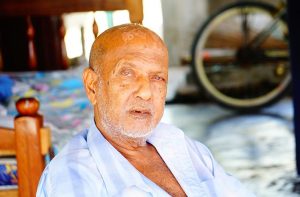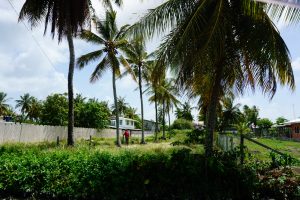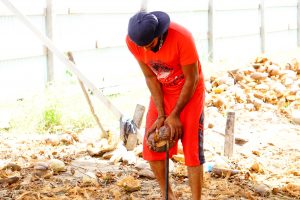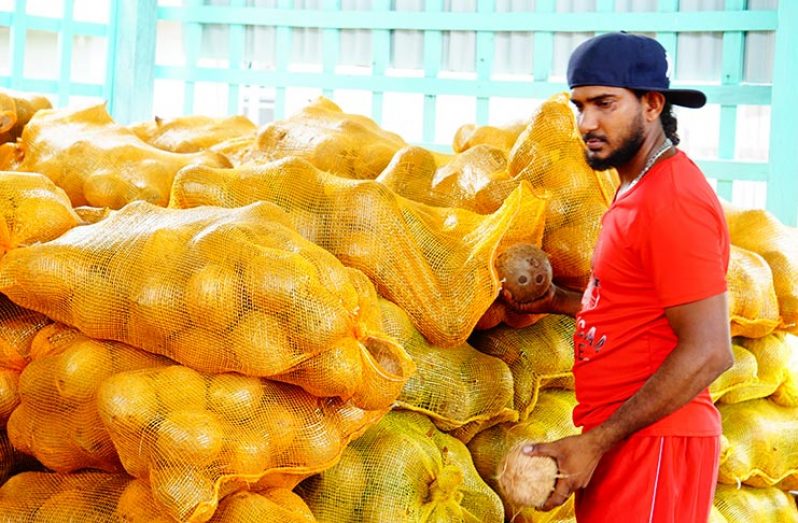By Michel Outridge

Samsundar Arjune is a village elder and is well-known among the people of Cotton Tree, West Coast Berbice.
Uncle Sundar, as he is called, believes that a simple way of life is the best medicine to longevity and if his wife was around it would have been even better.
Unfortunately, his wife of more than 30 years fell and received head injuries and had some internal bleeding which led to her passing away a few years ago.
The father of five told the Pepperpot Magazine that he has his own place at Mahaicony, East Coast Demerara but was the victim of greed by his own family.
He is originally from Mahaicony but 38 years ago he relocated to Cotton Tree after he got married his high school sweetheart.
“Both me and my wife used to attend Number Two Secondary School and we always had a crush on each other and a few years after high school we got married,” he said.

He began residing at his father-in-law’s place and he started a coconut oil business between himself and his wife.
Arjune added that he used to pick coconuts, peel it, wash it and make coconut oil after which it would be bottled and his wife would take it to the Rosignol Market to sell.
“It is not easy to lose someone you lived with for so long but she had a comfortable life and when she passed away. She was 68 years old and is the person I would have like to grow even older with,” he said.
He is, however, thankful after he lost his property at Mahaicony his father-in-law gave him a plot, the place he currently resides and he managed to construct a house.
“I had some cows and I sold it and bought some land behind the village that is used for farming these days,” he said.
At age 74, he is as jovial and pleasant as his younger days when he was a “sweet boy” in the village with just a few more ladies than usual but after marriage, he settled and dedicated his time and energy towards a good family life.
As he reflected on those days, he disclosed that most of the women he dated have since passed away.
Arjune reminisced on his youthful days when he used to work at Blairmont Sugar Estate as an ordinary labourer and worked his way up to a Charge Hand and later to a Foreman, a position he retired as.
He worked at the estate for more than 20 years and also worked at the Rice Resource Station at Burma, for a few years as a Checker of the different species of rice.
Arjune added that he was also a farmer back in the days and today, sitting down doing nothing is not easy for him because he is accustomed to hard work.
Due to age and illness, he is forced to take it easy and one day at a time and is being cared for by his daughter-in-law and a son.
“The only exercise I get these days is my hands would move from the plate to my mouth and I would at times go out the yard and sit outside for a bit,’ he said.
Arjune pointed out that life in Cotton Tree is good and it is home for him since it is a quiet and peaceful place to raise a family.
The Coconut Boss

Javed Ayube is utilising the many coconuts in his yard and around the village to make a living.
The father of two told the Pepperpot Magazine that when work was in sight he started the coconut business and today, he is known as the Coconut Boss of Cotton Tree Village.
Ayube stated that he would go around the village and pick coconuts or buy from villagers, after which he would peel it a crowbar and bag it for his wholesale buyers.
The small business operator has in his employ three persons from the community and has a 10-acre lot of coconut farm within the village.
The employees would use rope and climb the trees to pick dry coconuts and once they accumulate 10,000 or more they would begin peeing about 4,000 dry coconuts weekly.
An empty plot next to Ayube’s is used as the area to peel the dry coconuts and it has a shed.
The coconut husks are given to folks who are in the smoked fish business and the rest is discarded.
Presently, Ayube has in storage under his house about 120 bags of dried coconuts ready for the wholesale buyer but business is at a standstill due to the novel Coronavirus.
“This business is slow right now and it is not everyday work so I have to pay workers and the coconuts I sell have to be of a certain standard since it is export and not only domestic use,” he said. “This is a small operation and I try to make ends meet and pay the workers and also have money to buy dry coconuts when the need arises.”



.jpg)









